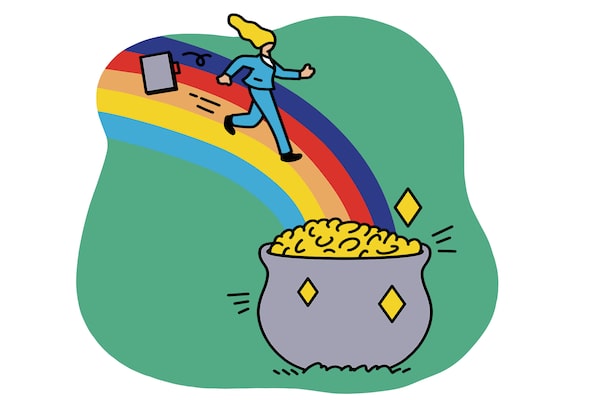
Illustration by Sam Island
Planning for your golden years doesn’t have to scare you. The reality of retirement is far more positive than people think. Ian McGugan answered commonly asked questions about planning for life after work. Here’s one to start.
Will I be poor and miserable in retirement?
Quite the contrary. Chances are you will be the happiest you have been since you were a teenager.
That is the most surprising takeaway from a Statistics Canada study of seniors published in 2018. The study analyzed responses from a national survey of nearly 20,000 Canadians. It found that people in their 60s, 70s and 80s reported higher satisfaction with their lives than people in their 20s, 30s, 40s or 50s.
In fact, the only people who rivalled seniors for life satisfaction were high-school-age kids.
Here's how much you need to save for retirement
“Seniors are more satisfied with their lives than those in younger age groups,” the study concluded.
Other research echoes that finding. “Retirement has a positive and significant effect on the life satisfaction of the older population in Canada,” write Anfal Adawi, Ida Ferrara and Sadia Malik of York University in a study published in Canadian Public Policy earlier this year.
“People tend to get happier as they get older,” is how Bonnie-Jeanne MacDonald, director of research for financial security at the National Institute on Ageing in Toronto, sums up the evidence.
This tendency to mellow with age continues for a surprisingly long time. People in their 60s were more satisfied with their lives than people in their 50s, according to the Statscan data, but people in their 70s and 80s were happier still. Remarkably, the two groups in the survey that were most likely to rank their life satisfaction at 10 out of 10 were the youngest (aged 15 to 19) and the oldest (over 70).
To be sure, there are limits to this data. As Ms. MacDonald notes, the people most likely to respond to a survey questionnaire are probably those who are still in good health. Aging isn’t easy for everyone. It is nearly always accompanied by challenges and losses of some kind.
Still, retirement manages to be a surprisingly satisfying time for many people, the Statscan findings show.
Money doesn’t seem to be a huge factor in creating this sense of contentment. Despite what the financial industry preaches, a bulging retirement account goes only so far toward achieving retirement bliss. Once you can cover your bills, adding more dollops of income has no significant impact on life satisfaction, according to the data.
What matters more is health and family. Healthy people are significantly happier than their unhealthy counterparts. People who are married or living together tend to be happier than those who are separated, divorced or widowed.
Maintaining other social connections also helps. More than eight in 10 seniors reported in the survey that they “always” or “often” had someone they could depend on to help when they really needed it. Seniors who had this support were significantly happier than those who didn’t, the study found.
Close personal connections become increasingly important in old age, Ms. MacDonald says. The number of people with significant mobility or health challenges rises sharply after 80. Adult children, living nearby, once helped their parents navigate the challenges of age, but that type of close family support is becoming increasingly uncommon.
“The bad news for baby boomers is they’ll live the longest life spans in history but have the fewest children to help them through it,” Ms. MacDonald says.
Don’t despair, though: If you’re a retiring boomer, you probably have siblings who may be able to help provide some of the same support that kids of your own once did, Ms. MacDonald says. Close friends may be able to pitch in, too.
The lesson here? Your financial portfolio matters, but don’t neglect your relationship portfolio. A kind sibling or close friend could turn out to be your most valuable retirement asset.

Ready to think about your (eventual) financial freedom?
Introducing Retire Rich Roadmap, a 5-part newsletter course to set you up with the tools you need to think about retirement, whether that's happening now or in a few decades. Sign up now – each lesson will land in your inbox on Thursday.
 Ian McGugan
Ian McGugan